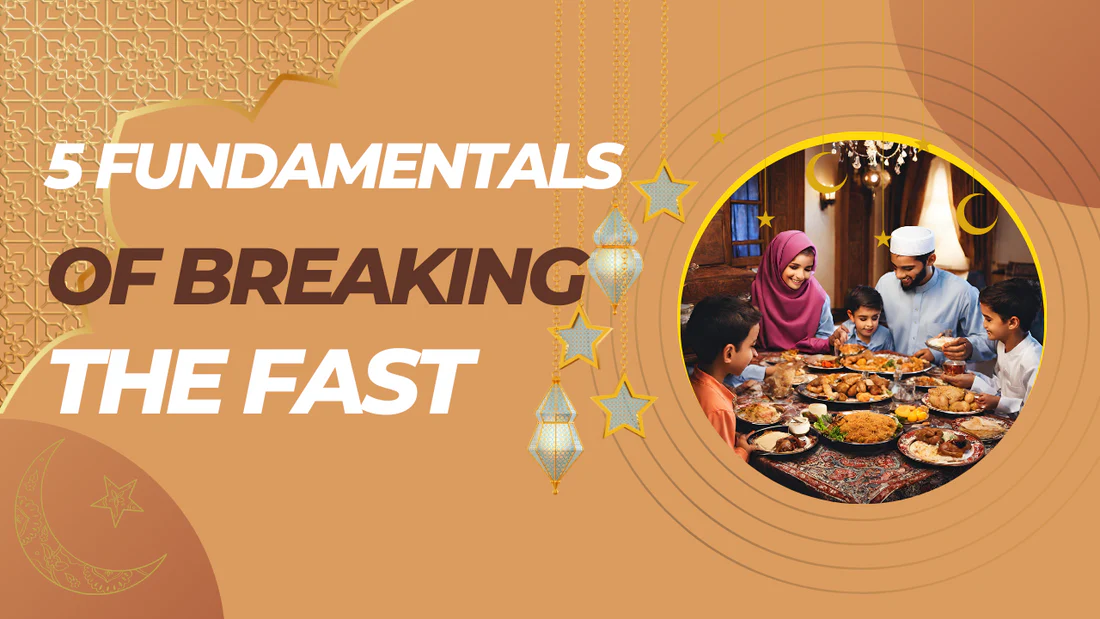Ramadan is a time for reflection, community, and of course, delicious food! But after a long day of fasting, it’s easy to go overboard at Iftar.
Introduction
This year, ditch the overstuffed feeling and learn 5 principles to a healthy and satisfying Iftar. We’ll show you how to avoid overeating, feel energized, and truly enjoy this special time with your loved ones.
The Significance of Breaking Fast in Ramadan
In the sacred tradition of Ramadan, breaking the fast is not merely a physical act but a profound spiritual endeavor.
This daily ritual, known as Iftar, transforms a simple act of eating into a powerful expression of gratitude and connection. As the call to prayer echoes at sunset, Muslims gather to break their fast together, sharing a meal that signifies not just the end of physical hunger, but the culmination of a day dedicated to self-discipline, prayer, and acts of charity. It’s an act for replenishing not just the body, but also the spirit. A moment of deep reflection, expressing thankfulness for God’s blessings and the opportunity to grow closer to Him.
Let’s discover the five indispensable principles of Iftar, for a healthy & balanced Ramadan fast break
Start Strong With Sahur
To truly thrive during this holy month, Muslims are encouraged to partake in Sahur, the pre-dawn meal consumed before the fast begins.
Think of Sahur as the champion’s breakfast for your Ramadan experience. It provides the essential energy you need to tackle the day ahead. Consuming a balanced Sahur helps combat Hunger Pangs by providing sustained energy release, Sahur helps you avoid those distracting growls throughout the fast, allowing you to focus on your spiritual endeavors. Furthermore, a well-balanced Sahur promotes mental clarity and alertness, keeping you engaged in your daily activities and prayers.
This practice is a Sunnah, and is rooted in the Prophet Muhammad’s (PBUH) actions. By following his example and taking Sahur, you demonstrate your commitment to the spirit of Ramadan and strengthen your connection to the Prophet’s teachings.
Stay Hydrated Till Adan Al Fajr
Staying cool and hydrated throughout your fast is crucial during Ramadan. Aim to drink eight glasses of water throughout the permitted hours, between Iftar (breaking the fast) and Suhoor (pre-dawn meal). Sipping frequently ensures steady absorption and prevents dehydration.
In addition to water, incorporate foods with high water content into your diet. Soups, fruits like watermelon, and vegetables like cucumber and spinach are excellent choices. These contribute significantly to your daily fluid intake and help you stay cool.
Try to avoid excessive consumption of coffee, tea, and sugary drinks, especially before dawn (Al Fajr).
These can worsen thirst and dehydrate you faster, making the fast more challenging. Don’t forget to limit spending prolonged periods in direct sunlight, particularly during the hottest hours of the day.
While the sight and aroma of a delicious Iftar can be enticing, prioritizing mindful eating is key to a healthy and fulfilling experience in Ramadan.
Prioritize Protein and Healthy Fats for Iftar
Following the tradition (Sunnah) of Prophet Muhammad (PBUH), it’s recommended to break the fast with dates or water. This gentle approach eases your digestive system back into function after the extended fast.
A good rule of thumb is to prioritize eating protein and healthy fats. These provide sustained energy and help curb cravings throughout the evening.
Opt for grilled chicken, fish, skinless poultry, or legumes (lentils, beans) during Iftar. These options provide essential amino acids for muscle repair and overall well-being. Eggs, a versatile and readily available source of protein, can be incorporated in various ways – boiled, scrambled, or included in omelets for a filling and nutritious meal.
While protein and healthy fats take center stage, complex carbohydrates play a vital role in a balanced Iftar meal.
Choose fiber-rich options like whole grains (brown rice, quinoa) or whole-wheat bread. These provide sustained energy and dietary fiber, aiding digestion and promoting gut health. Don’t forget the power of vegetables! Packed with essential vitamins, minerals, and fiber, they are a crucial component of a healthy Iftar.
Furthermore, protein and healthy fats help regulate blood sugar levels, preventing the inevitable crashes experienced after consuming sugary foods. This translates to fewer cravings and a more balanced approach to eating during Ramadan.
While prioritizing protein and healthy fats promotes satiety, mindful eating habits are key to avoiding overindulgence. Planning your Iftar meals in advance can significantly help you make informed choices when breaking the fast.
Embrace Gentle Activity During the Fast
While fasting can leave you feeling drained, staying completely inactive can worsen fatigue. Short walks or simple stretches can improve blood flow, gently wake you up, and prepare your body for the upcoming fast. Consider low-impact activities like light cardio. Remember, moderation is key. Consult a doctor if you have any concerns about exercising during this time, especially with pre-existing health conditions.
Integrate movement into your daily routine throughout the day. Take the stairs instead of the elevator, park further away and walk to your destination, or do simple stretches during work breaks. These simple actions combat stiffness and fatigue, significantly improving your overall well-being during the fast.
Light movement offers numerous benefits. Improved blood circulation ensures essential nutrients are delivered throughout your body, keeping you energized. Gentle exercise can alleviate aches and stiffness that may arise during the fast, while even low-intensity physical activity can enhance mental alertness and improve focus throughout the day.
As the day draws to a close and the call to Maghrib (evening prayer) resonates, Muslims around the world prepare to break their fast. This moment transcends simply satisfying physical hunger; it signifies the culmination of spiritual reflection and dedication. Incorporating sincere duas (supplications) becomes an essential part of this profound experience.
Duas serve as a direct line of communication between us and the Almighty. During Iftar (breaking the fast), specific duas hold immense significance:
- “Allahumma inni laka sumtu wa bika aamantu wa alayka tawakkaltu wa ala rizqika aftartu. Faghfirli fa innaka anta al-Ghafur al-Rahim” (O Allah, for You I fasted, and upon You I believed, and in You I put my trust, and on Your provision I break my fast. Forgive me, for You are indeed the Oft-Forgiving, the Most Merciful). This dua expresses gratitude for the sustenance received and seeks forgiveness for any shortcomings during the fast.
- “Dhahaba al-zama’u, wa abtallat al-‘uruq, wa thabata al-ajru insha’Allah” (The thirst is gone, the veins are moistened, and the reward is assured, if Allah wills). This dua acknowledges the completion of the fast and expresses hope for Allah’s reward.
Duas uttered with sincerity and a pure heart hold immense power. By incorporating these practices into your Iftar routine, you can enjoy a fulfilling ramadan experience and and strengthen your faith through acts of gratitude.
A Ramadan Filled with Blessings
By incorporating these principles, you can cultivate a Ramadan that nourishes your body and soul. Remember, prioritizing a balanced approach and mindful practices is key to a truly fulfilling experience.
As the holy month unfolds, may it be filled with blessings, self-discovery, and a deepened connection to the divine.


